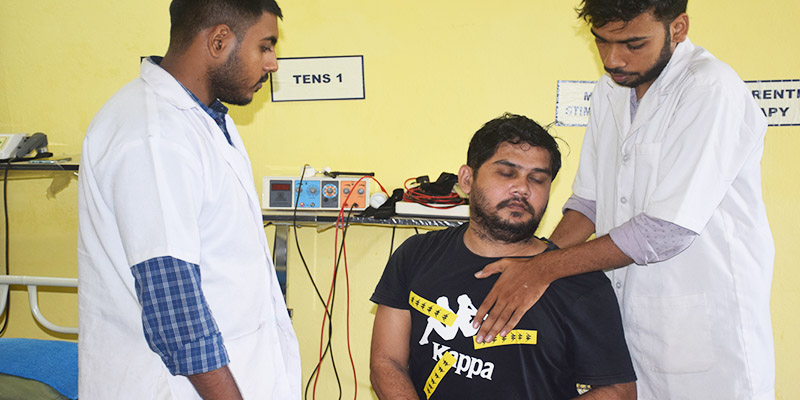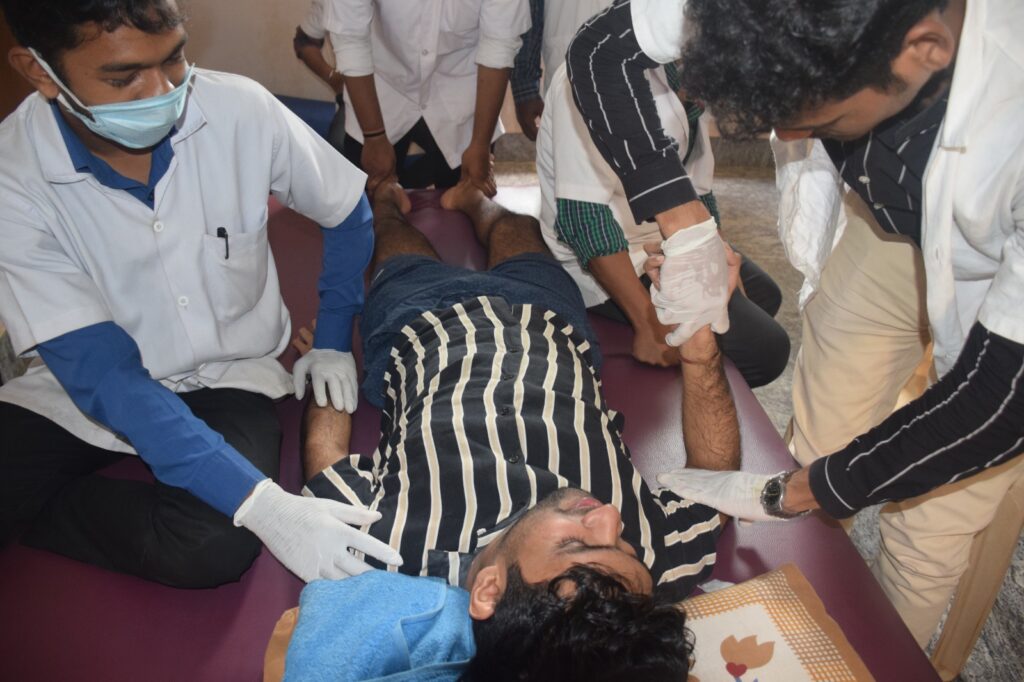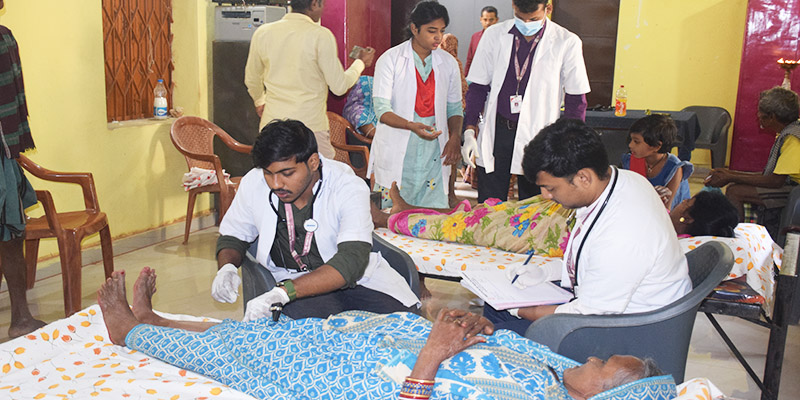In the ever-evolving field of healthcare, specialization has become essential to provide the highest level of care and expertise to patients. One such specialized area is Neurology, and pursuing a MPT Neurology (Master’s in Physiotherapy- Neurology) with a focus on Neurology can open up a realm of lucrative future opportunities for aspiring physiotherapists.
In this blog, we explore seven solid reasons why pursuing an MPT in Neurology can be a transformative step in your career.
7 Reason to Choose MPT Neurology

- Meeting the Growing Demand
Neurological disorders are on the rise due to various factors, including lifestyle changes and an aging population. MPT Neurology scope is always been high.
As a result, there is an increasing demand for qualified physiotherapists with expertise in Neurology.
By pursuing an MPT Neurology, you position yourself to address this demand and make a significant impact on patients’ lives.
Read More: Reasons To Choose Institute of Health Sciences, Bhubaneswar 11 Top (& Honest)
- Specialized Expertise
Neurological conditions are complex and diverse, requiring specialized knowledge and skills to effectively treat patients.
An MPT Neurology equips you with in-depth insights into various neurological disorders, their underlying mechanisms, and evidence-based treatment approaches.
This specialized expertise enhances your ability to provide targeted and effective care.
- Enhanced Career Opportunities
Completing an MPT Neurology opens doors to a range of rewarding career opportunities.
You can work in hospitals, rehabilitation centers, research institutions, or even establish your own practice. Your expertise in Neurology will make you a sought-after professional in the field.
- Holistic Patient Care

Neurological disorders often have wide-ranging effects on patients’ physical, emotional, and psychological well-being.
With an MPT Neurology, you learn to provide holistic care that addresses not only physical symptoms but also considers the overall quality of life of your patients.
Read More: Speech And Hearing Course Fees
- Research and Innovation
Advancements in Neurology and physiotherapy are ongoing, and professionals with a background in MPT Neurology are at the forefront of such innovations.
Pursuing this course empowers you to contribute to research, develop new treatment techniques, and improve the outcomes of patients with neurological conditions.
- Multidisciplinary Collaboration
Neurological rehabilitation often involves collaboration with other healthcare professionals such as neurologists, occupational therapists, and speech therapists.
An MPT Neurology equips you with the knowledge to work seamlessly within multidisciplinary teams, enhancing patient care and outcomes.
Read More: Career In Occupational Therapy
- Making a Meaningful Difference
Perhaps the most compelling reason to pursue an MPT Neurology is the opportunity to make a meaningful difference in the lives of individuals battling neurological conditions.
Your expertise can help patients regain mobility, improve their quality of life, and restore hope for a brighter future.
How to Become a Neurological Physiotherapist?

The field of neurological physiotherapy is a rewarding and specialized branch of healthcare that focuses on treating individuals with neurological disorders, injuries, and conditions.
As a neurological physiotherapist, you play a vital role in helping patients regain their mobility, improve their quality of life, and restore their independence. MPT Neurology salary is also good.
If you aspire to become a skilled and knowledgeable neurological physiotherapist (MPT Neurology) and want to know how to become a neurological physiotherapist? Simply follow below steps:
Read More: Public Health Course
Step 1: Obtain a Bachelor’s Degree in Physiotherapy
The journey to becoming a neurological physiotherapist begins with a solid educational foundation. Pursue a Bachelor’s degree in Physiotherapy from a reputable institution.
This foundational education equips you with the fundamental knowledge and skills required for a career in physiotherapy.
BASLP Admission 2023: For Aspiring Speech And Hearing Professionals
Step 2: Gain Clinical Experience
During your Bachelor’s program, seize every opportunity to gain practical experience through internships, clinical placements, and hands-on training.
This exposure allows you to work with diverse patient populations and conditions, providing you with valuable insights into the world of physiotherapy.
Step 3: Pursue a Master’s in Physiotherapy (MPT) with a Focus on Neurology
To specialize in neurological physiotherapy, consider pursuing a Master’s in Physiotherapy (MPT) with a focus on neurology.
This advanced degree program delves into the intricacies of neurological disorders, rehabilitation techniques, and evidence-based practices.
Throughout the MPT neurology program, you’ll develop expertise in assessing, diagnosing, and treating patients with neurological conditions.
Read More: BASLP Subjects
Step 4: Gain Specialized Knowledge
Within the MPT neurology program, you’ll dive deep into topics such as neuroanatomy, neurophysiology, and the management of neurological conditions.
You’ll learn to design tailored treatment plans that address each patient’s unique needs and challenges. Additionally, you’ll explore the latest advancements in neurological rehabilitation techniques.
Step 5: Practical Training and Clinical Exposure
Hands-on experience is essential to becoming a skilled neurological physiotherapist.
Engage in practical training sessions and clinical rotations where you work under the guidance of experienced professionals as per your MPT Neurology syllabus.
This exposure hones your assessment and treatment skills while building your confidence in managing various neurological conditions. There are many MPT Neurology jobs available.
Read More: Reasons To Choose Institute of Health Sciences, Bhubaneswar 11 Top (& Honest)
Step 6: Obtain Licensure and Certification
After completing your MPT neurology program, you’ll need to obtain the necessary licensure to practice as a physiotherapist in your region.
Additionally, consider pursuing certifications in neurological physiotherapy offered by reputable organizations.
Certification demonstrates your commitment to expertise and ongoing professional development.
Step 7: Continual Learning and Professional Development

The field of neurological physiotherapy is constantly evolving, with new research and techniques emerging regularly.
Stay updated by attending workshops, conferences, and seminars focused on neurological rehabilitation.
Continual learning ensures that you provide the highest level of care to your patients.
Read More: Career In Occupational Therapy
Why Choose Autonomous Institute of Health Sciences for MPT Neurology?

The Autonomous Institute of Health Sciences stands out as a premier institution for pursuing an MPT Neurology, and here’s why:







Admission Process For MPT Neurology
Here’s the step-by-step guide to secure your admission:
- Open the website ihs.ac.in.
- Navigate to the academic programs section.
- Find the MPT Neurology.
- Click on “take admission.”
- Fill in your name and contact information.
- Upload the required certificate file.
- Make a payment of MPT Neurology course fees ₹20,000/- as the admission fee.
- Our counselor will review your documents and confirm your admission for the session 2023-24.
- For any queries or assistance, feel free to contact our counselor 98273-73644, 89172-96239 or the Course Coordinator 98677 58589.
Conclusion:
Pursuing an MPT in Neurology is a step towards becoming a specialized healthcare professional equipped to address the challenges posed by neurological disorders.
The combination of specialized knowledge, career opportunities, and the ability to make a profound impact on patients’ lives makes this course a truly rewarding path for aspiring physiotherapists.
This institute offers extremely good MPT Neurology salary in india.
It also offers courses such as Public Health Course, Master Degree In Psychiatric Social Work, BASLP course, Bachelor of Physiotherapy, Master in Rehabilitation Science, MA in Yoga, B.Ed. in Autism, Other Certification Courses.
When considering where to pursue this journey, the Autonomous Institute of Health Sciences emerges as the ideal choice, ensuring you receive top-notch education and training that will propel you towards a successful and fulfilling career in Neurology.
This insitute is a unit of Margdarsi which is a best physiotherapy centre in bhubaneswar.
Common Questions On MPT Neurology
[saswp_tiny_multiple_faq headline-0=”h5″ question-0=”What is MPT in neurology?” answer-0=”MPT stands for Master of Physiotherapy. In the context of neurology, it refers to a specialized postgraduate degree program that focuses on treating patients with neurological conditions through physiotherapy techniques.” image-0=”” headline-1=”h5″ question-1=”What is the qualification for MPT neurology?” answer-1=”To pursue MPT in neurology, you typically need a Bachelor’s degree in Physiotherapy (BPT) or an equivalent degree from a recognized institution. Admission requirements may vary among universities.” image-1=”” headline-2=”h5″ question-2=”Can a physiotherapist become a neurologist?” answer-2=”While a physiotherapist can specialize in neurological conditions through MPT programs, they do not become neurologists in the medical sense. Neurologists are medical doctors who diagnose and treat neurological disorders. Physiotherapists work alongside neurologists to provide rehabilitation services.” image-2=”” headline-3=”h5″ question-3=”What is the salary of MPT neuro in India?” answer-3=”The salary of an MPT neuro in India can vary widely based on factors such as experience, location, and the type of employer. On average, MPT graduates specializing in neurology can earn a competitive salary, but specific figures may differ.” image-3=”” headline-4=”h5″ question-4=”Which specialization is best in MPT?” answer-4=”The best specialization in MPT depends on individual interests and career goals. Specializations like orthopedics, neurology, sports, cardiorespiratory, and pediatrics are popular choices.” image-4=”” headline-5=”h5″ question-5=”What is the highest salary in MPT?” answer-5=”The highest salary for MPT professionals can vary greatly and is influenced by factors like specialization, experience, location, and employer. Some experienced and highly specialized MPT professionals can earn substantial salaries.” image-5=”” headline-6=”h5″ question-6=”Can we write Dr after MPT?” answer-6=”In most cases, individuals with an MPT degree are not entitled to use the title “Dr.” as it is typically reserved for medical doctors (MDs) and individuals with doctoral degrees (PhDs). MPT is a master’s level degree.” image-6=”” headline-7=”h5″ question-7=”Are MPT graduates called doctors?” answer-7=”MPT graduates are not usually addressed as doctors, as the term “doctor” is commonly associated with medical doctors (MDs) and those with doctoral degrees (PhDs).” image-7=”” headline-8=”h5″ question-8=”What is the future after MPT?” answer-8=”After completing MPT, individuals can work as specialized physiotherapists in various healthcare settings, pursue academic and research roles, or even establish their own clinics. Continuous learning and skill development are crucial for career growth.” image-8=”” headline-9=”h5″ question-9=”Is MPT higher than DPT?” answer-9=”MPT (Master of Physiotherapy) and DPT (Doctor of Physical Therapy) are different degrees. MPT is a master’s level degree, while DPT is a clinical doctorate in physical therapy. The two degrees have different educational paths and scopes.” image-9=”” headline-10=”h5″ question-10=”Can I become an orthopedic surgeon after MPT?” answer-10=”No, completing an MPT degree does not qualify you to become an orthopedic surgeon. Orthopedic surgeons are medical doctors who specialize in surgical interventions for musculoskeletal conditions. MPT focuses on physiotherapy and rehabilitation, not surgery.” image-10=”” headline-11=”h5″ question-11=”What is the salary of MPT in India per month?” answer-11=”The salary of MPT professionals in India can vary widely based on factors like experience, location, specialization, and employer. On average, entry-level MPT professionals may earn around Rs. 20,000 to Rs. 40,000 per month, but this can vary significantly.” image-11=”” count=”12″ html=”true”]
